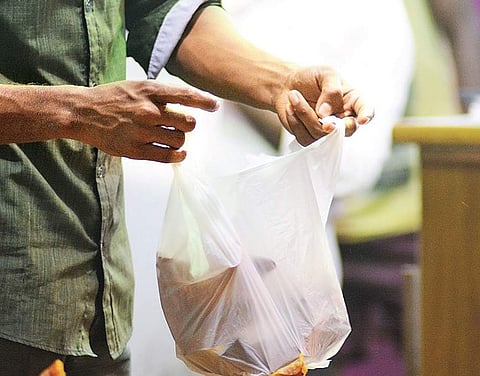

CHENNAI: To mark the World Environment Day observed on Tuesday, Chief Minister Edappadi K Palaniswami has announced that the manufacture, use and storage of non-biodegradable plastic items including plastic sheets, plastic plates, tea cups, water buckets, plastic straws, handbags, plastic coir made of plastic would banned from January 1, 2019 under the Environment (Protection) Act, 1986. However, plastic covers being used for packaging milk, curd, oil and medicines will be exempted from this ban. This ban is effected after a gap of 15 years.
Making a suo motu statement under Rule 110 in the State Assembly, the chief minister said “With a view to give time to the public and traders to get accustomed to the use of cloth bags and paper bags in lieu of plastic bags, the government has fixed the date of implementation of ban on non-biodegradable plastics from January 1, 2019 instead of enforcing the ban with immediate effect.
"Recalling that the Rain Water Harvesting Scheme of Jayalalithaa was implemented successfully with the cooperation of the people to fortify the groundwater table in Tamil Nadu, the chief minister said “Let us all vow to leave a plastic free Tamil Nadu to our future generations.”
A legislation on the ban of non-biodegradable plastics is likely to be introduced in the Assembly in due course to give effect to the announcement of the chief minister. In 2002, the government headed by late Chief Minister J Jayalalithaa banned the use of these plastic in 2002. However, the legislation in this regard was withdrawn in March, 2003 without assigning any reason.
The chief minister pointed out that the use and throw plastic items thrown by people obstruct the flow of water and spoils the water.
Further, these plastic items also block the sewerage and hence prevent the increase in the groundwater table. Above all, rain water stagnated in plastic wastes became breeding sources for mosquito and in turn spreading the communicable diseases like malaria and dengue.
Moreover, during rainy season, these plastic wastes cause flooding.
When these plastics are burnt, it pollutes the air too. Cattle Stock when they eat these plastic wastes along with their food, they lose their lives. So, non biodegradable plastics pollutes earth, water and air leading to health and environmental hazards. As such, avoiding the use of such plastics becomes inevitable, Palaniswami added.
Recalling that Jayalalithaa had constituted an experts committee to study the health and environmental hazards of use of plastics and this committee recommended to ban the use and throw non-biodegradable items. The committee encouraged the use of banana leaves, areca betel nut leaf cups, lotus leaves etc.